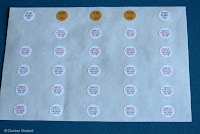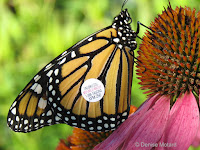TAGGING MONARCH BUTTERFLIES
WHY TAG MONARCHS? For the same reasons that we tag or band other animals (birds, sharks, etc.). Scientists learn valuable information on the whereabouts and migrations of these species with tracking devices. This in turn helps with conservation initiatives. The Monarch butterfly has mystified researchers for a long time before discovering where they were spending the winter.
Tagging monarchs allows scientists to learn more about their migration patterns and changes. The tagging information provided in this section comes from Monarch Watch, a research and citizen science program undertaken by the University of Kansas.
HOW: The photos below show what the tiny tags look like. If someone finds or catches a monarch butterfly with a tag, they can provide the information about that butterfly to either a toll-free number or email address on the tag. Each tag has its own code, for example XPM 272. Tagging instructions are available on this page of Monarch Watch.
The second photo shows an array of tags ready to use. The idea behind the toothpick is to put the tag onto something that allows us to take it without touching the adhesive side. Butterfly wings have powder, so if there’s not enough adhesive left on the tag it won’t stick to the wing.
 |
| Monarch butterfly tags |
 |
| Monarch tags ready for use |
MONARCHS WITH TAGS: Here are some photos of what a Monarch butterfly looks like with its tag. The tag is pressed on the outside of the hind wing, and the location is very precise as per the instructions from Monarch Watch. Out of all the photos below, only one Monarch had its tag put in the right location, and its the last one with tag XPM 254. The tag has to be on that discal cell, NOT on the black veins. There must be a good reason for this requirement.
 |
| This male has tag XPM 219 |
 |
| My 1st tagged Monarch: XPM 219 |
 |
| Tagged XPM 219 in Juniper |
 |
| Female with tag YUA 775 getting released |
 |
| Female with YUA 775 tag on juniper |
 |
| Monarch male with tag XPM 250 |
 |
| Female with tag XPM 251 |
 |
| Monarch male with tag XPM 254 |
Here’s a video below of the Monarch male with tag XPM 219 trying its wings following its release:
Below are examples of things going wrong (which can happen when you are new to tagging Monarch butterflies). The reverse of the tag shows the wing powder, especially from the black vein, stuck to the adhesive. But the reason why this tag didn’t work is that the toothpick broke, and we can see its tip mark on the tag. To prevent this from happening again, I used the larger end of the toothpicks after that mishap.
The second photo shows the female for which that tag was intended. We can see the missing powder on its hind wing. Then on the right, the tag failed on this male monarch, and this is what the wing looks like when the powder is gone. With such a handicap, how are these monarchs going to fly all the way down to Mexico?
The female monarch on the screen below was successfully tagged, however upon closer look of its left hind wing, opposite the tagged wing, there is a circular area with less powder. This area matches the tagged area on the other side. It’s as if too much pressure was applied on the wing and this bruised the opposite wing.
The last photo shows the outside of the hind wing opposite to the tagged one. It got a little bit wrinkled and again, this might be due to too much pressure when applying the tag.
 |
| Failed tag with wing powder |
 |
| Male lost powder on hind wing due to failed tagging |
 |
| Left hind wing has lost powder due to failed tagging |
 |
| Tagged female Monarch shows missing wing powder on opposite wing |
 |
| Female hind wing wrinkled from tagging |